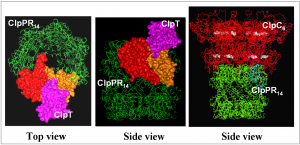
-Magdalen Lindeberg
Chloroplasts not only capture light energy from the sun, but they also have enormous potential as factories for production of transgenic proteins. Plants generally are a promising source of pharmaceutical and nutritional compounds given their relatively economical production. One of the best known examples of plant-produced pharmaceuticals is the anti-Ebola drug Zmapp, produced by genetically modified tobacco.
Chloroplasts have particular advantages for protein production. Evolutionarily derived from free-living single celled organisms, chloroplasts have their own genome. Proteins transgenically expressed from the chloroplast genome can accumulate to very high levels and are compartmentalized within the plastid. However, in some cases accumulation is limited owing to protein degradation by chloroplast proteases.
The research program of Klaas van Wijk, SIPS Section of Plant Biology, has received funding from the National Science Foundation to characterize the network of protein degrading enzymes (proteases) at work in the chloroplast. Understanding the dynamics of protein degradation will provide clues on how to design proteins that can accumulate to higher levels. Additionally, describing this process in Arabidopsis thaliana, a plant commonly used in the lab, will provide a model for understanding protein degradation in plant species better suited for large scale production.
This research will build upon past characterization of the Clp protease system by the van Wijk lab.
Read more:
- NSF-MCB – June 2016-June 2019 ($830,000) – Klaas J. van Wijk (PI)
CHLOROPLAST SOLUBLE PROTEASES AND THEIR PHYSIOLOGICAL SUBSTRATES:
An integrated genetic and targeted systems analysis of chloroplast proteolysis - Jin, S., and Daniell, H. (2015) The Engineered Chloroplast Genome Just Got Smarter. Trends in Plant Science 20:622-640.
- Maliga, P., and Bock, R. (2011). Plastid biotechnology: food, fuel, and medicine for the 21st century. Plant Physiology 155, 1501-1510.
- Peters, J., and Stoger, E. (2011). Transgenic crops for the production of recombinant vaccines and anti-microbial antibodies. Hum Vaccin 7, 367-374.
- Peltier, J.-B., Ripoll, D.R., Friso, G., Rudella, A., Cai, Y., Ytterberg, J., Giacomelli, L., Pillardy, J., and van Wijk, K.J. 2004. Clp Protease Complexes from Photosynthetic and Non-photosynthetic Plastids and Mitochondria of Plants, Their Predicted Three-dimensional Structures, and Functional Implications. Journal of Biological Chemistry 279:4768-4781.
